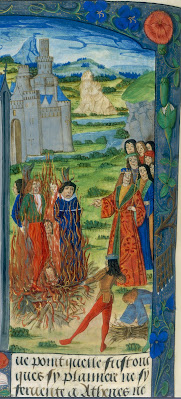Their Christian attitude did not always exist in their neighbors, or in the Church. Although Cardinal Jacques de Vitry supported them, and the Bishop of Lièges even created a rule for them, some communities cast an unkind eye upon the Beguines because of their ambiguous social status: they lived "in the world, but were not of it."
Beguines became viewed as ostentatious in their lifestyle, as hypocritical because they did not commit to a religious Rule, and even as obnoxiously superior to cloistered religious: the founder of the Sorbonne, Robert de Sorbon, pointed out that they were far more devoted to God than monks, since they pursued the religious life without vows and without being removed from the temptations of the world. This realization could annoy small-minded laity and clergy alike.
There is also the chance that the Church resented a large religious group over which they had no formal control. One well-known Beguine, Marguerite Porete, was burned at the stake on 1 June 1310 because of a book she wrote that was considered heretical. A year later, the Council of Vienne discussed the nature of the human soul. Because the Beguines believed the human soul could be perfected by proper Christian behavior in this world, the Council condemned them as heretics. This same Council condemned the Knights Templar, removing the pope's support from them at the instigation of the French king.
There are Beguines (or Beguine-ish) groups today: the Company of St. Ursula, and recent groups in Vancouver, America, and Germany. The Church also allows "Consecrated Diocesan Hermits," but they must take their formal vows in front of a bishop; then they can live on their own.
But let's go back to Marguerite Porete and find out what she and her book were about more specifically. See you next time.

